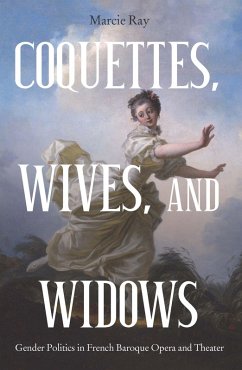A revelatory study of how composers and dramatists of seventeenth- and eighteenth-century France criticized and trivialized independent women in their portrayals of them in works of theater and opera.
Seventeenth- and eighteenth-century French theatrical works created an uneasy dialogue with the often-blistering depictions of marriage in contemporary writings by literary women. For over a century, composers and librettists attempted to silence such anti-traditionalist views through dramas that ridicule, banish, or, even more violently, silence and subjugate female characters who resist marriage. These dramas portray independent-minded women as agents ofchaos who deploy their sexuality to destabilize class demarcations, or to destroy families and at times the monarchy itself.
Coquettes, Wives, and Widows: Gender Politics in French Baroque Opera and Theater shows how dramatists wrested narratives away from women and weaponized those narratives in a defense of the status quo. It examines a wide range of works of different types: from Jean-Philippe Rameau's Platée, ou Junon jalouseand André Campra's Aréthuse, ou la Vengeance de l'Amour to representative works from the Comédie Française, the Comédie Italienne, and the fairgound theaters. Each theater offered denigrating portraits of independent womenas dissolute, obstinate, and extremist.
The operas and other theatrical works explored in Coquettes, Wives, and Widows reveal who (in the view of many at the time) should exercise authority to make choices aboutwomen's lives. They also give evidence of widespread fears about how society might change if it were to grant women themselves that responsibility.
Marcie Ray is Associate Professor of Musicology at Michigan State University.
Hinweis: Dieser Artikel kann nur an eine deutsche Lieferadresse ausgeliefert werden.
Seventeenth- and eighteenth-century French theatrical works created an uneasy dialogue with the often-blistering depictions of marriage in contemporary writings by literary women. For over a century, composers and librettists attempted to silence such anti-traditionalist views through dramas that ridicule, banish, or, even more violently, silence and subjugate female characters who resist marriage. These dramas portray independent-minded women as agents ofchaos who deploy their sexuality to destabilize class demarcations, or to destroy families and at times the monarchy itself.
Coquettes, Wives, and Widows: Gender Politics in French Baroque Opera and Theater shows how dramatists wrested narratives away from women and weaponized those narratives in a defense of the status quo. It examines a wide range of works of different types: from Jean-Philippe Rameau's Platée, ou Junon jalouseand André Campra's Aréthuse, ou la Vengeance de l'Amour to representative works from the Comédie Française, the Comédie Italienne, and the fairgound theaters. Each theater offered denigrating portraits of independent womenas dissolute, obstinate, and extremist.
The operas and other theatrical works explored in Coquettes, Wives, and Widows reveal who (in the view of many at the time) should exercise authority to make choices aboutwomen's lives. They also give evidence of widespread fears about how society might change if it were to grant women themselves that responsibility.
Marcie Ray is Associate Professor of Musicology at Michigan State University.
Dieser Download kann aus rechtlichen Gründen nur mit Rechnungsadresse in A, D ausgeliefert werden.
Hinweis: Dieser Artikel kann nur an eine deutsche Lieferadresse ausgeliefert werden.









